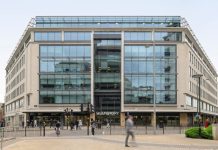National law firm Mills & Reeve has published their 2024 sustainability report, which covers the firm’s commitment to net zero, cutting carbon commissions and how best to approach risk management, and includes their sustainable initiatives for their new office in Birmingham.
Commitment to net zero
Recognising the importance of decarbonising, in 2022 Mills & Reeve announced their intention to achieve net zero for scopes 1 and 2 by 2030, and all scopes by 2050 at the latest.
Also committing to having their targets validated by the Science Based Targets initiative (SBTi), they’re working with consultants to help set these targets and put a submission together by the end of 2024.
The firm has recently achieved ISO 14001 accreditation giving a universal international standard for environmental management, enabling them to improve their environmental performance by optimising resource usage and reduction of waste and identify areas for continual improvement.
Case study: Sustainability in the heart of Birmingham
Recently announced, Mills & Reeve will be moving their Birmingham office to a new location, from Colmore Row to the new Paradise development, which has been designed to be a modern, sustainable office for a purpose led future.
A purposeful, forward-thinking landmark building that connects people together, Mills & Reeve works closely with designers, Claremont, to make sure the space is as sustainable as possible.
Faten Bawadejki, an interior designer from Claremont, explains in more detail:
“As part of the design brief, Mills & Reeve worked closely with us to ensure that sustainability was fundamental to the ethos of the scheme, which includes setting out to achieve SKA Silver. SKA is an accreditation scheme that sets out sustainable criteria to help assess fit-out projects in a quantifiable way against good practice measures. This includes looking at ways to reduce waste, design for efficiency, reduce the amount of existing furniture sent to landfill, work with local contractors, and many other assessed categories to ensure that the design is sustainable.
“Furniture is always a large part of any project, so we audited all the existing furniture and have reused 73%, designing it into the scheme from the beginning so it fits with the overall look and feel. We assessed any new furniture required for carbon impact, and have specified criteria for fabrics such as EU Ecolabels and recyclable content.
“For the flooring, we’re using the old stock carpet leftover from previous Mills & Reeve office fit-outs alongside new flooring that has recycled/recyclable content or similar. For example, Marmoleum is made up of 97% renewable natural raw materials including cocoa beans, wood flour, linseed oil, jute and limestone. Our supplier also offers a takeback scheme where the product can be fully biodegraded in a controlled environment at the end of its required use.
“We’ve crafted the workspace with adaptability in mind, anticipating its evolution over time. Our careful consideration of flexibility is reflected in the design of the flooring, lighting, and acoustic layouts. This ensures that the firm can seamlessly adjust and expand within the space, adapting to accommodate changes without compromising functionality and aesthetic appeal.”
Jessica Wilkes Ball, Senior Sustainability Manager at Mills & Reeve, said:
“Mills & Reeve is committed to minimising their impact on the environment, ensuring the promotion of environmental sustainability in all aspects of their operations, and recognising responsibility for guardianship of the environment.
“Businesses like Mills & Reeve have both a moral and commercial imperative to maintain and increase the momentum towards improving sustainability. It makes sense to do this together.”





















